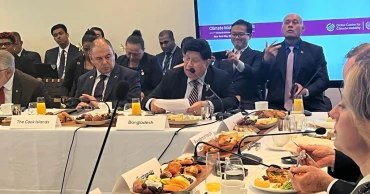Climate Migrants
Momen emphasizes importance of targeted policy interventions for climate migrants
Foreign Minister Dr AK Abdul Momen has emphasized the importance of targeted policy interventions for climate migrants as part of the global commitment to ‘leave no one behind.’
He was addressing a high-level breakfast of the Climate Mobility Summit on ‘Harnessing Climate Mobility for Adaptation and Resilience’ held on September 20, on the sidelines of the 78th UN General Assembly in New York.
Dr. Momen also urged for mainstreaming of the issue of climate mobility in both climate change and migration discourses, said the Ministry of Foreign Affairs.
FM Momen for strengthening trade, investment ties with African nations
He further emphasized the need to establish international financing mechanisms to support climate migrants, including the proposed loss and damage fund.
The Foreign Minister also highlighted Bangladesh’s climate vulnerability and the challenges posed by climate-induced displacement of approximately 650,000 people every year.
He shared various actions taken by the government to address climate-induced displacements in the country, including the world’s largest climate migrants’ rehabilitation project in Cox’s Bazar.
Moderated by Amy Pope, Director General-elect of International Organisation for Migration (IOM), the event was co-hosted by Bangladesh, Tuvalu, Niger, Botswana, Tonga, Comoros, Guatemala as well as, IOM, President of the UN General Assembly and UN Global Centre of Climate Mobility.
Read Cyber Security Bill before making comments: FM
Heads of states/governments, ministers and the high officials of various UN agencies took part in the discussion.
The leaders underscored the gravity of the climate crisis, pointing out that by 2050, over 200 million people could be forced to leave their homes due to climate change impacts.
The leaders stressed that women and girls, young people, individuals with disabilities, and indigenous communities suffer disproportionately from these effects.
Youth are driving force of our nation, their innovative ideas invaluable: FM
The timely mobilization of resources for climate finance and the implementation of early warning systems and data management were highlighted as crucial aspects of any solution.
2 years ago
Bangladesh seeks urgent action for protection of climate migrants
The recently adopted UN General Assembly Resolution, requesting for an advisory opinion of the International Court of Justice (ICJ) on obligations of states in respect to climate change, recognizes the link between climate change and displacement of affected persons.
Bangladesh’s Foreign Secretary Masud Bin Momen said this while speaking at a panel discussion organized by IOM during its 2023 International Dialogue on Migration held at the United Nations Headquarters.
Referring to the extreme vulnerability of Bangladesh to climate change, Foreign Secretary Momen shared the various initiatives undertaken by the government of Bangladesh in addressing the impact of climate change including the 8th Five Year Plan incorporating action point to address the environment, climate change adaptation and mitigation; establishment of a Climate Change Trust Fund; and launching of ‘Mujib Climate Prosperity Plan’.
Prime Minister Sheikh Hasina has also undertaken the biggest housing project for climate migrants in Cox’s Bazar, Bangladesh, the “Khurushkul Special Ashrayan Project”, he further added.
Expressing concern over the inadequate action of the international community on the protection of persons displaced by climate change and associated disaster, he urged to scale up global actions including climate financing.
Read more: Bangladesh urges global solidarity to address gaps in migrants’ human rights
2 years ago
7.1 million Bangladeshis displaced by climate change in 2022: WHO
With an aim to support countries and territories to build professional competence and capacity to adequately address refugee and migrant health issues, the World Health Organization (WHO) is organising the third edition of its annual Global School on Refugee and Migrant Health in Dhaka with a focus on capacity-building.
Over five days, from November 28 to December 2, policymakers, UN partner agencies, academia, members of civil society, and stakeholders at the Global School will exchange knowledge and experiences to address key elements of capacity-building.
The e-learning hybrid event hosted by the Ministry of Health, Bangladesh will be streamed globally.
Read more: COP27: How will UN climate deal on loss and damage work?
Globally, one in eight or over one billion people today are migrants with 281 million international migrants and many million individuals who are stateless, WHO said.
Climate change, rising inequality, conflicts, trade, and population growth are accelerating these trends.
The health workforce has a vital role in providing for the health rights and needs of refugees and migrants.
Read more: Climate Change: UN, Bangladesh to strengthen cooperation
“Migration and displacement can have deep and long-lasting impacts on physical and mental health and well-being, and cultural and linguistic differences, financial barriers, stigma and discrimination can all hamper access to health services for refugees and migrants,” said Dr Tedros Adhanom Ghebreyesus, WHO Director-General on Monday.
“Health workers have a crucial role in helping to overcome these barriers. The WHO Global School on Refugee and Migrant Health is a valuable resource for building the capacity of health workers to better serve refugees and migrants.”
While not all refugees and migrants are vulnerable, often they are, due to an array of determinants, from xenophobia and discrimination to poor living, housing, and working conditions, and inadequate access to health services that are people-centered and which are sensitive to refugee and migrant health needs.
Read More: Time running out for climate negotiators over loss and damage
“Human right to health is a right that extends to all people everywhere, especially refugees and migrants. Because to be truly respected, protected and fulfilled, a right must be fully enjoyed by the most marginalized and vulnerable – those at risk of or who are already being left behind, which often includes people on the move,” said Dr Poonam Khetrapal Singh, Regional Director, WHO South-East Asia addressing the participants.
Held in a different location each year, the Global School aims to leverage the learnings and experiences of countries in close collaboration with WHO and governments.
This year, over 7.1 million Bangladeshis were displaced by climate change, a number that could reach 13.3 million by 2050, according to WHO.
Read More: UN climate talks drag into extra time with scant progress
Since 1978, the country has also witnessed three major influxes of forcibly displaced Myanmar nationals totalling more than one million people each with unique medical needs and housed in one of the world’s largest and most densely populated camps in Cox’s Bazar.
“Not only has Bangladesh provided them access to free health care – including, most recently, COVID-19 vaccines – but it has also made concerted efforts to address key social, economic, environmental, and legal vulnerabilities,” said the Regional Director.
“The yearly Global School on Refugee and Migrant Health is a flagship of the WHO Health and Migration Programme and an opportunity to strengthen the strategic and operational collaboration with Regional and country offices on refugee and migrant health towards the implementation of the Global Action Plan on promoting the health of refugees and migrants 2019-2023 (GAP),” said Dr Santino Severoni, Director of the Health and Migration Programme.
Read More: UNICEF wants investment in world's first child-focused climate risk financing solution
Open to all audiences, the Global School aims to reach a diverse audience of policy makers, health sector managers, and officers working at different levels within Ministries of Health.
Researchers, University students, nongovernmental agencies, youth representatives and journalists also participate.
“From each context to the next, no challenge is the same, nor will there be the solution. But of critical need to all countries and health systems is a health workforce that is well-trained, culturally sensitive and competent, and which is sensitive to the needs of refugees and migrants, their languages and unique health problems,” said Dr Poonam Khetrapal Singh.
Read More: EU shakes up climate talks with surprise disaster fund offer
3 years ago
Dhaka calls for more IOM role in helping climate migrants
Foreign Minister AK. Abdul Momen has called upon the International Organization for Migration (IOM) to engage in further advocacy on the climate-migration nexus.
He made this suggestion when the newly appointed IOM Chief of Mission in Bangladesh Abdusattor Esoev met him to present his credentials at the Ministry of Foreign Affairs on Tuesday.
The foreign minister underscored that the international community should find appropriate ways to address both internal and international movements of people due to climate change, according to MoFA.
Read: No chance of Chinese debt trap: FM
Momen welcomed the IOM country chief and assured him of necessary cooperation in discharging his responsibilities.
He acknowledged IOM’s engagement with the Rohingya humanitarian response and stressed the importance of continued international support amid emergency situations in other parts of the world.
3 years ago
For climate migrants in Bangladesh, town offers new life
The 29-year-old Monira Khatun was devastated after her husband abandoned her suddenly. She returned to her father only to face another blow: He died soon after, leaving her to shoulder three other family members’ care. Without any work, she was worried about how she would feed them.
“I lost everything. There was darkness all around,” Khatun said. “My parents’ home was gone to the river for erosion, we had no land to cultivate.”
She ended up working at a factory in a special economic zone that employs thousands of climate refugees — like Khatun — in the southwestern town of Mongla, where Bangladesh’s second-largest seaport is located.
Read:War shakes Europe path to energy independence, climate goals
3 years ago
Dhaka seeks global support in rehabilitation of climate migrants
Bangladesh has urged global leaders to share the burden of rehabilitation of the climate migrants, noting that each year thousands of people are being uprooted from their sweet homes and traditional jobs due to global warming, riverbank erosion and erratic climate changes.
As the CVF (Climate Vulnerable Forum (CVF) President, Foreign Minister Dr AK Abdul Momen urges the international community to proactively address the unique challenges of the CVF countries.
“They indeed need further support in building capacity for trade-facilitation reforms. Otherwise, they would have to sacrifice development and quality of life for their citizens,” said Dr Momen while delivering his remarks at a webinar on “Climate Change Priorities in Trade and Investment” on Monday evening.
World Trade Organization (WTO) Director-General Dr Ngozi Okonjo-Iweala, WIPO Director-General Daren Tang, Deputy Secretary-General of UNCTAD Isabelle Durant and Deputy to the Director-General of UNIDO Hiroshi Kuniyoshi also joined it.
The Foreign Minister flagged six points and first, he said, all must be strict in implementing the Paris Agreement.
Secondly, Dr Momen said, transfer of clean, green, and advanced technology to developing countries at affordable costs, including for meeting energy requirements is crucial.
Sharing his third point, the Foreign Minister said, developed countries must keep their commitments to mobilise 100 billion dollars annually for climate finance with a 50:50 balance between adaptation & mitigation finance.
Fourth, he said, climate-vulnerable countries’ development needs, including climate smart agriculture, sustainable industrialisation, and enhanced contribution to the global value chain, must be addressed by decisive actions.
Fifth, the Foreign Minister said collaborative steps must be taken for ensuring sustainable marine fishing which is important for preserving marine ecosystems and combating climate change.
“It also remains crucial that developed countries and global financial institutions extend developing economies access to low-interest financing for climate friendly and climate proof trade and investment,” Dr Momen said as he flagged the sixth point.
Dr Momen thanked Bangladesh’ Permanent Mission in Geneva for organising this event. “Indeed, we’re speaking at a time when the correlation between human activities and climate change is more scientifically proven.”
He said climate change is the single most harmful contributor to humanity and the planet and this has severely impacted human lives and livelihoods. “The increased number of climate disasters and their impacts have brought vulnerable countries to a tipping point of irreversible damage.”
As identified by the United Nations, Dr Momen said, climate-related disasters increased by 83 per cent in the first two decades of the 21st century compared to the last two decades of the 20th century.
“These have affected our agriculture, food, energy security, economic growth, and sustainable development. Needless to say, the implications are more disastrous for the most vulnerable countries,” he said.
READ: FM for well-calibrated action agenda for tourism sector
Bangladesh contributes less than 0.47 per cent to global carbon emissions and its per capita carbon-di-oxide emission is 0.5 metric tons, which is about 30 times less than that in the high emitting countries.
“However, we’re the seventh most climate-vulnerable nation. The whole coastal area of Bangladesh, which includes the gateways of our international trade, is under serious threat. Frequent disasters often severely disrupt our domestic supply chain,” he said, adding that, “We’ve lost our land and capital due to sea-level rise. Our infrastructure and transport routes are regularly hit hard by the climate effects that affect transportation of goods and services.”
Despite constraints, Dr Momen said, under the visionary leadership of Prime Minister Sheikh Hasina, Bangladesh has emerged as a global leader in climate change adaptation.
Bangladesh is the first LDC to set up a self-financed 450 million dollars “Bangladesh Climate Change Trust Fund” back in 2009 that supports nearly 800 adaptation and resilience projects in the vulnerable areas of the country.
“Bangladesh has one of the world’s most extensive domestic solar energy programmes. Last year, we submitted our updated NDC to the UNFCCC, enhancing both unconditional and conditional contributions with ambitious quantifiable mitigation targets,” he said.
4 years ago
World must share responsibility of climate migrants: Hasina
Prime Minister Sheikh Hasina has said the world has to share the responsibility of climate migrants and address the issue of losses and damages caused by climate change.
“Without ambitious mitigation efforts, only adaptation measures are not enough to slow, stop and reverse the adverse impacts of climate change,” she said.
The Prime Minister said this while delivering her keynote speech titled “Call for Climate Prosperity” at the Scottish Parliament on Tuesday.
Speaker Alison Johnstone received Sheikh Hasina on her arrival at the Scottish Parliament. Sheikh Rehana and CVF Thematic Ambassador Saima Wazed Hossain were present.
Sheikh Hasina reiterated that the major gas-emitting countries must submit and implement aggressive nationally determined contributions (NDCs).
Read: Effective climate plans not possible without funds: Hasina
She said the developed countries must fulfill their commitment of providing 100 billion dollars annually for addressing climate change to the developing countries, with a special focus on the climate vulnerable countries.
“These amounts should be in addition to the existing ODA, and there needs to be synergy among the different climate funds. The distribution of the climate fund should have a 50:50 ratio between adaptation and mitigation,” she added.
The Prime Minister emphasized the dissemination of green technology from developed countries to developing countries at an affordable cost.
She said the global leaders have gathered in Glasgow to demonstrate resolve and ambition on climate action combining their global collective efforts to respond to the unprecedented challenges and risks of the adverse impacts of climate change from which no country is immune.
Referring to the recently published IPCC 6 Assessment report, she said it is another wake-up call for all to take decisive action now to save the planet from temperature rise that cannot be reversed, and a climate disaster.
“We’re facing the most serious global challenge of humankind. It’s a major threat to climate-vulnerable countries like Bangladesh though we contribute less than 0.47 per cent of global emissions,” she observed.
Hasina mentioned that extreme temperature, erratic rainfall, flood and drought, more intense tropical cyclones, sea-level rise, seasonal variation, river erosion, ocean acidification are causing severe negative impacts on the lives and livelihoods of millions of the people of Bangladesh and other climate vulnerable countries.
“Sea-level rise induced by global warming is a serious threat for Bangladesh. With a 1-metre rise of sea level, tens of millions of people in the coastal area of Bangladesh will be displaced,” she said.
Hasina said every year 2 percent of the country’s GDP is lost due to the adverse impact of climate change, and it may go up to 9 percent in the coming decades. “Bangladesh has already six million climatically displaced population with an additional burden of 1.1 million Myanmar Rohingyas.”
Besides, the Covid-19 pandemic has created additional challenges to address, said the Prime Minister.
Read: Women bear the brunt of climate change: Hasina
The Prime Minister said although Bangladesh is climate vulnerable, it is globally recognised for its resilience. The government, with its own financing, has established the Bangladesh Climate Change Trust Fund (BCCTF).
Under this fund, Bangladesh has taken 800 projects so far with the investment of USD 480 million, which mainly focuses on adaptation, mitigation, and climate change research, she said.
The government has adopted the "Bangladesh Delta Plan 2100", a comprehensive 100-year strategic plan aimed at gradual, sustainable development through adaptive delta management process targets to achieve a safe, climate-resilient and prosperous delta, Hasina added.
Currently, the country is advancing and formulating a National Adaptation Plan (NAP) that will significantly enhance its adaptation ambition, she added.
“Bangladesh revised and submitted an updated NDC on August 26, 2021, enhancing unconditional and conditional contribution with ambitious quantifiable mitigation targets,” the Prime Minister said.
Bangladesh is also committed to following a progressive approach to developing its economy on a low carbon pathway. “We’ve recently cancelled 10 projects of coal-based power plants worth 12 billion dollars of investment.”
In Bangladesh, she said, 6.5 million households have solar power for domestic use, one of the largest amounts of off-grid solar power generation in the world. “We’ve the target of generating 40 percent of our energy from renewable sources by 2041.”
“We’re also procuring electric locomotives for our mass transit system, further reducing our carbon footprint,” she said.
Bangladesh has already started working to introduce a significant number of electric cars within the next few years. Charging stations for these cars will be set up all across the country, she added.
In celebration of the birth centenary of Father of the Nation Bangabandhu Sheikh Mujibur Rahman, she said, “We are planting 30 million saplings across the country. Additionally, to reduce the risk of death from lightning strikes, the government has planted 5.4 million palm trees, further contributing to carbon sink.”
As the country needs to focus on overcoming risks and becoming prosperous despite those prevailing risks managing the adverse risks of climate change, so the government set its trajectory from one of vulnerability to resilience to prosperity (VRP), she said.
The Prime Minister said Bangladesh will soon launch the "Mujib Climate Prosperity Plan," a strategic investment framework to mobilise financing, including through international cooperation, for implementing renewable energy generation and climate resilient initiatives.
“Our Delta Plan 2100 has also been taken into account while developing the Mujib Climate Prosperity Plan. We’re also planning to re-build and reinforce the embankments in the coastal region as well as in the areas prone to river erosion as part of our adaptation measures,” she added.
She hopes to establish solar panels and wind turbines on these embankments for supplying power to the national grid. The net metering system where even domestic households with solar panels can contribute to the national grid, and then get their bills adjusted accordingly, will also be an effective tool in our prosperity plan.
“We expect to achieve transformative change through MCPP by leapfrogging on a number of technological and economic fronts. We also hope to be able to access the global funds available for green investment and enhance the quality of education and capacity building of our youth,” she said.
This will help Bangladesh to reach the target of a developed country status faster, she hoped.
4 years ago
Dhaka for establishing fund for climate migrants by V20
Foreign Minister Dr AK Abdul Momen has proposed establishing a fund by V20 for the rehabilitation and reintegration of climate migrants to societies, or else, they could be a "security risk".
"V20 (Vulnerable Twenty) may think of establishing a Fund for their rehabilitation and reintegration to societies, otherwise they could be a security risk," he said.
Each year, Dr Momen said, thousands of people are uprooted from their sweet homes and traditional jobs due to global warming, inundation and river erosion.
Also read: Vulnerable economies call on rich nations to avert global climate-Covid economic threat
"These displaced people, we term them as ‘Climate Migrants’ need to be rehabilitated," he said while addressing the Climate Vulnerables' Finance Summit on Thursday night.
4 years ago






.jpg)





